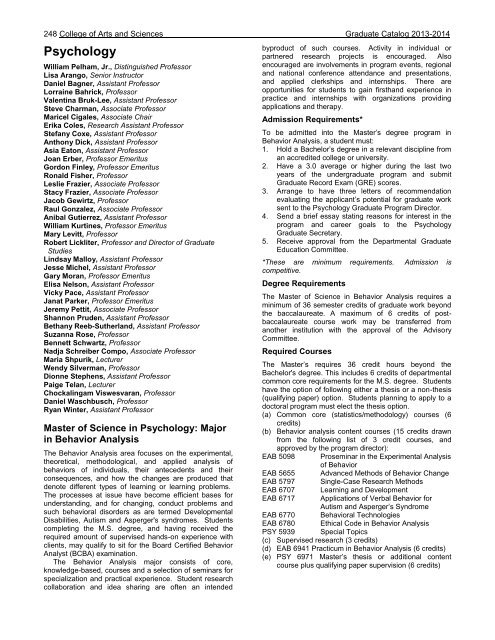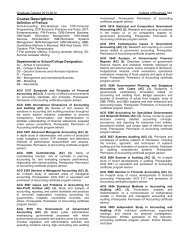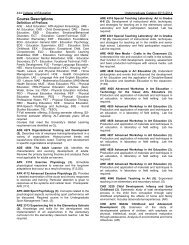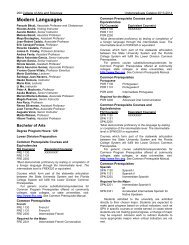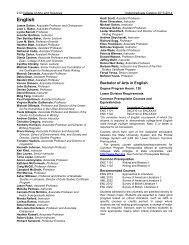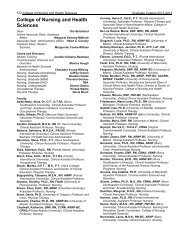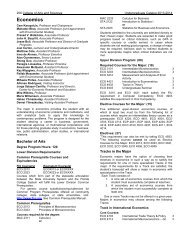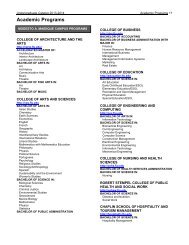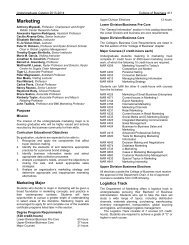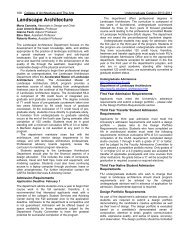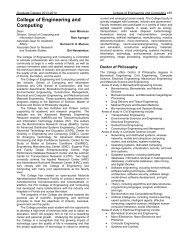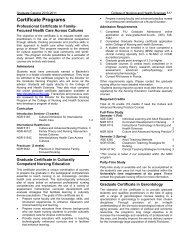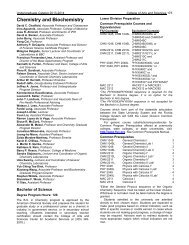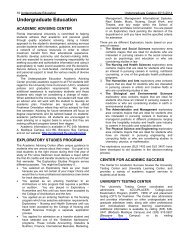Psychology - Course Catalogs
Psychology - Course Catalogs
Psychology - Course Catalogs
Create successful ePaper yourself
Turn your PDF publications into a flip-book with our unique Google optimized e-Paper software.
248 College of Arts and Sciences Graduate Catalog 2013-2014<br />
<strong>Psychology</strong><br />
William Pelham, Jr., Distinguished Professor<br />
Lisa Arango, Senior Instructor<br />
Daniel Bagner, Assistant Professor<br />
Lorraine Bahrick, Professor<br />
Valentina Bruk-Lee, Assistant Professor<br />
Steve Charman, Associate Professor<br />
Maricel Cigales, Associate Chair<br />
Erika Coles, Research Assistant Professor<br />
Stefany Coxe, Assistant Professor<br />
Anthony Dick, Assistant Professor<br />
Asia Eaton, Assistant Professor<br />
Joan Erber, Professor Emeritus<br />
Gordon Finley, Professor Emeritus<br />
Ronald Fisher, Professor<br />
Leslie Frazier, Associate Professor<br />
Stacy Frazier, Associate Professor<br />
Jacob Gewirtz, Professor<br />
Raul Gonzalez, Associate Professor<br />
Anibal Gutierrez, Assistant Professor<br />
William Kurtines, Professor Emeritus<br />
Mary Levitt, Professor<br />
Robert Lickliter, Professor and Director of Graduate<br />
Studies<br />
Lindsay Malloy, Assistant Professor<br />
Jesse Michel, Assistant Professor<br />
Gary Moran, Professor Emeritus<br />
Elisa Nelson, Assistant Professor<br />
Vicky Pace, Assistant Professor<br />
Janat Parker, Professor Emeritus<br />
Jeremy Pettit, Associate Professor<br />
Shannon Pruden, Assistant Professor<br />
Bethany Reeb-Sutherland, Assistant Professor<br />
Suzanna Rose, Professor<br />
Bennett Schwartz, Professor<br />
Nadja Schreiber Compo, Associate Professor<br />
Maria Shpurik, Lecturer<br />
Wendy Silverman, Professor<br />
Dionne Stephens, Assistant Professor<br />
Paige Telan, Lecturer<br />
Chockalingam Viswesvaran, Professor<br />
Daniel Waschbusch, Professor<br />
Ryan Winter, Assistant Professor<br />
Master of Science in <strong>Psychology</strong>: Major<br />
in Behavior Analysis<br />
The Behavior Analysis area focuses on the experimental,<br />
theoretical, methodological, and applied analysis of<br />
behaviors of individuals, their antecedents and their<br />
consequences, and how the changes are produced that<br />
denote different types of learning or learning problems.<br />
The processes at issue have become efficient bases for<br />
understanding, and for changing, conduct problems and<br />
such behavioral disorders as are termed Developmental<br />
Disabilities, Autism and Asperger's syndromes. Students<br />
completing the M.S. degree, and having received the<br />
required amount of supervised hands-on experience with<br />
clients, may qualify to sit for the Board Certified Behavior<br />
Analyst (BCBA) examination.<br />
The Behavior Analysis major consists of core,<br />
knowledge-based, courses and a selection of seminars for<br />
specialization and practical experience. Student research<br />
collaboration and idea sharing are often an intended<br />
byproduct of such courses. Activity in individual or<br />
partnered research projects is encouraged. Also<br />
encouraged are involvements in program events, regional<br />
and national conference attendance and presentations,<br />
and applied clerkships and internships. There are<br />
opportunities for students to gain firsthand experience in<br />
practice and internships with organizations providing<br />
applications and therapy.<br />
Admission Requirements*<br />
To be admitted into the Master’s degree program in<br />
Behavior Analysis, a student must:<br />
1. Hold a Bachelor’s degree in a relevant discipline from<br />
an accredited college or university.<br />
2. Have a 3.0 average or higher during the last two<br />
years of the undergraduate program and submit<br />
Graduate Record Exam (GRE) scores.<br />
3. Arrange to have three letters of recommendation<br />
evaluating the applicant’s potential for graduate work<br />
sent to the <strong>Psychology</strong> Graduate Program Director.<br />
4. Send a brief essay stating reasons for interest in the<br />
program and career goals to the <strong>Psychology</strong><br />
Graduate Secretary.<br />
5. Receive approval from the Departmental Graduate<br />
Education Committee.<br />
*These are minimum requirements. Admission is<br />
competitive.<br />
Degree Requirements<br />
The Master of Science in Behavior Analysis requires a<br />
minimum of 36 semester credits of graduate work beyond<br />
the baccalaureate. A maximum of 6 credits of postbaccalaureate<br />
course work may be transferred from<br />
another institution with the approval of the Advisory<br />
Committee.<br />
Required <strong>Course</strong>s<br />
The Master’s requires 36 credit hours beyond the<br />
Bachelor's degree. This includes 6 credits of departmental<br />
common core requirements for the M.S. degree. Students<br />
have the option of following either a thesis or a non-thesis<br />
(qualifying paper) option. Students planning to apply to a<br />
doctoral program must elect the thesis option.<br />
(a) Common core (statistics/methodology) courses (6<br />
credits)<br />
(b) Behavior analysis content courses (15 credits drawn<br />
from the following list of 3 credit courses, and<br />
approved by the program director):<br />
EAB 5098 Proseminar in the Experimental Analysis<br />
of Behavior<br />
EAB 5655 Advanced Methods of Behavior Change<br />
EAB 5797 Single-Case Research Methods<br />
EAB 6707 Learning and Development<br />
EAB 6717 Applications of Verbal Behavior for<br />
Autism and Asperger’s Syndrome<br />
EAB 6770 Behavioral Technologies<br />
EAB 6780 Ethical Code in Behavior Analysis<br />
PSY 5939 Special Topics<br />
(c) Supervised research (3 credits)<br />
(d) EAB 6941 Practicum in Behavior Analysis (6 credits)<br />
(e) PSY 6971 Master’s thesis or additional content<br />
course plus qualifying paper supervision (6 credits)
Graduate Catalog 2013-2014 College of Arts and Sciences 249<br />
Master of Science in <strong>Psychology</strong>: Major<br />
in Counseling <strong>Psychology</strong><br />
The Counseling <strong>Psychology</strong> Masters major area is<br />
committed to preparing future therapists, counselors,<br />
consultants, and researchers for the independent and<br />
licensed professional practice of counseling,<br />
psychotherapy, and psychotherapy research. The major<br />
offers students a solid foundation in psychology that<br />
focuses on evidence-based practices in mental health,<br />
mental health counseling, and mental health research.<br />
Opportunities for specializing in a range of clinical<br />
problems and diverse populations are offered through<br />
faculty guided research and supervised clinical training.<br />
Completion of the major requirements leads to a<br />
Master of Science in <strong>Psychology</strong> and eligibility for a<br />
license to practice as a Mental Health Counselor (LMHC)<br />
in Florida. The major is designed to train practitioners and<br />
researchers to function in a variety of mental health<br />
settings in both the private and public sector. The core<br />
curriculum is intended to engage students in the advanced<br />
study of psychology with a focus on developing applied<br />
counseling and therapeutic skills for working in<br />
multicultural environments with populations that range<br />
across the life span from childhood to later adulthood.<br />
Admission Requirements*<br />
To be admitted into the Master’s degree program in<br />
Counseling <strong>Psychology</strong>, a student must:<br />
1. Hold a Bachelor’s degree in a relevant discipline from<br />
an accredited college or university.<br />
2. Have a 3.0 average or higher during the last two<br />
years of the undergraduate program and submit<br />
Graduate Record Exam (GRE) scores.<br />
3. Arrange to have three letters of recommendation<br />
evaluating the applicant’s potential for graduate work<br />
sent to the <strong>Psychology</strong> Graduate Program Director.<br />
4. Send a brief essay stating reasons for interest in the<br />
program and career goals to the <strong>Psychology</strong><br />
Graduate Secretary.<br />
5. Receive approval from the Departmental Graduate<br />
Education Committee.<br />
*These are minimum requirements. Admission is<br />
competitive.<br />
Degree Requirements<br />
The Master of Science in Counseling <strong>Psychology</strong> requires<br />
a minimum of 60 semester credits of graduate work<br />
beyond the baccalaureate. A maximum of 6 credits of<br />
post-baccalaureate course work may be transferred from<br />
another institution with the approval of the Advisory<br />
Committee.<br />
Required <strong>Course</strong>s<br />
The Counseling <strong>Psychology</strong> curriculum consists of 60<br />
credit hours of graduate study, as required for certification,<br />
that includes coursework, clinical training, and either a<br />
thesis or non-thesis option. Students planning to apply to a<br />
doctoral program must elect the thesis option.<br />
(a) Common core (statistics/methodology/assessment)<br />
courses (9 credits)<br />
(b) Counseling <strong>Psychology</strong> content courses (36 credits<br />
drawn from the following list of 3 credit courses and<br />
approved by the program director):<br />
CLP 5166 Advanced Abnormal <strong>Psychology</strong><br />
(Advanced Psychopathology)<br />
CLP 5931 Ethical Code in Psychological Practices<br />
CLP 6436 Introduction to Psychological<br />
Assessment<br />
CLP 6498 Diagnosis and Treatment of Sexual<br />
Disorders<br />
CYP 5534 Groups as Agents of Change<br />
CYP 6526 Psychological Methods of Program<br />
Evaluation and Research<br />
CYP 6536 Principles and Methods of Psychological<br />
Consultation<br />
CYP 6766 The <strong>Psychology</strong> of Cross Cultural<br />
Sensitization<br />
CYP 6936 Current Issues in Community<br />
<strong>Psychology</strong><br />
DEP 5069 Applied Life Span Developmental<br />
<strong>Psychology</strong><br />
DEP 5405 Proseminar in <strong>Psychology</strong> of Adulthood<br />
and Aging<br />
PCO 5311 Theory, Research, and Treatment of<br />
Addictive Behavior<br />
PCO 6206 Principles and Practices of Counseling<br />
and Psychotherapy<br />
PSY 5939 Special Topics<br />
(c) Supervised clinical practicum/internship courses (9<br />
credits)<br />
(d) PSY 6971 Master’s thesis (thesis option) or additional<br />
practicum/internship courses and qualifying paper<br />
(non-thesis option) (6 credits)<br />
Master of Science in <strong>Psychology</strong>: Major<br />
in Developmental Science<br />
Developmental science is concerned with the description<br />
and explanation of change over time in humans and other<br />
organisms. The Developmental Science area integrates a<br />
life-span orientation toward developmental science in an<br />
international and interdisciplinary multicultural urban<br />
context. Students majoring in the area complete core<br />
course requirements designed to facilitate a thorough<br />
grounding in research, theory, and methods across the<br />
lifespan, develop an area of specialization within or across<br />
the lifespan, and receive training in both basic and applied<br />
research in developmental science. The program is<br />
designed for individuals desiring intermediate graduate<br />
level professional training in lifespan developmental<br />
science, either to further career goals or in preparation for<br />
doctoral level graduate study.<br />
Up to 36 credits taken as part of this M.S. degree will<br />
count toward fulfilling the Ph.D. requirements for students<br />
who successfully apply to transfer to the Developmental<br />
Science Ph.D. program. Students meeting the<br />
requirements for admission to the doctoral program may<br />
apply for a transfer upon completion of a master’s thesis<br />
proposal approved by the thesis committee and the<br />
recommendation of their thesis advisor.<br />
Admission Requirements*<br />
To be admitted into the Master’s degree program in<br />
Developmental Science, a student must:<br />
1. Hold a Bachelor’s degree in a relevant discipline from<br />
an accredited college or university.
250 College of Arts and Sciences Graduate Catalog 2013-2014<br />
2. Have a 3.0 average or higher during the last two<br />
years of the undergraduate program and submit<br />
Graduate Record Exam (GRE) scores.<br />
3. Arrange to have three letters of recommendation<br />
evaluating the applicant’s potential for graduate work<br />
sent to the <strong>Psychology</strong> Graduate Program Director.<br />
4. Send a brief essay stating reasons for interest in the<br />
program and career goals to the <strong>Psychology</strong><br />
Graduate Secretary.<br />
5. Receive approval from the Departmental Graduate<br />
Education Committee.<br />
*These are minimum requirements. Admission is<br />
competitive.<br />
Degree Requirements<br />
The Master of Science in Developmental Science requires<br />
a minimum of 36 semester credits of graduate work<br />
beyond the baccalaureate, including a thesis based upon<br />
the student’s original research. A maximum of 6 credits of<br />
post-baccalaureate course work may be transferred from<br />
another institution with the approval of the student’s<br />
advisor.<br />
Required <strong>Course</strong>s<br />
Developmental Science MS students would be required to<br />
complete the 6 credits of departmental common core<br />
course requirements, along with more specialized content<br />
courses and a course involving directed independent<br />
effort, as listed below:<br />
(a) Common core requirements (6 credits of<br />
statistics/methodology courses)<br />
(b) Developmental Science content courses (15 credits<br />
drawn from the following list of 3 credit courses and<br />
approved by the program director):<br />
CLP 5169 Proseminar in Developmental<br />
Psychopathology<br />
CLP 6168 Psychopathology Across the Life Span<br />
DEP 5056 Current Issues in Life Span<br />
Development<br />
DEP 5068 Applied Life Span Developmental<br />
<strong>Psychology</strong><br />
DEP 5058 Bio-Behavioral Development<br />
DEP 5099 Proseminar in Infancy, Childhood, and<br />
Adolescence<br />
DEP 5185 Emotional Learning and Its Reversal<br />
DEP 5186 Special Topics in Developmental<br />
<strong>Psychology</strong><br />
DEP 5188 Current Issues in Cognitive and<br />
Perceptual Development in Infancy<br />
DEP 5315 Proseminar in Parent-Child Relations<br />
DEP 5405 Proseminar in the <strong>Psychology</strong> of<br />
Adulthood and Aging<br />
DEP 5608 Theoretical Perspectives in<br />
Developmental <strong>Psychology</strong><br />
DEP 5725 Seminar in Psychosocial Development<br />
DEP 5796 Developmental Methods<br />
DEP 5930 Outreach Research<br />
DEP 5936 Integrating Theory and Research in<br />
Developmental Science<br />
DEP 6117 <strong>Psychology</strong> of Caregiving<br />
DEP 6466 Cognitive Processes in Aging<br />
DEP 6477 <strong>Psychology</strong> of Social Processes in<br />
Aging<br />
DEP 7096 Seminar in <strong>Psychology</strong> of Life-Span<br />
Social Development<br />
EAB 5098<br />
EAB 6707<br />
PSY 5930<br />
PSY 5939<br />
SOP 5081<br />
Proseminar in Behavior Analysis<br />
Learning and Development<br />
Qualitative Methods<br />
Special Topics<br />
Psychological Influence on Health and<br />
Illness<br />
(c) Supervised research/independent study/field<br />
experience/internship (3 credits)<br />
(d) Electives (6 credits)<br />
(e) PSY 6971 Masters Thesis (6 credits)<br />
Master of Science in <strong>Psychology</strong>: Major<br />
in Industrial-Organizational <strong>Psychology</strong><br />
The Industrial Organizational (I/O) <strong>Psychology</strong> major<br />
focuses on issues such as the psychology of Human<br />
Resource Management, Group Behavior, Cultural<br />
Diversity in Organizations, Personality, Team<br />
Effectiveness, Personnel Selection, Leadership,<br />
Organizational Stress, and Training and Development.<br />
The major emphasizes a commitment both to research<br />
and application as a part of individual specialty area<br />
development. Students master a series of core courses<br />
designed to provide a thorough grounding in theory,<br />
methodology, and content in applied and basic research in<br />
psychology. These courses are taught by faculty who are<br />
involved in research and practice in the relevant areas.<br />
In addition, seminars reflecting the specialized foci of<br />
the Industrial-Organizational area faculty are offered.<br />
There are also opportunities for practice and occasional<br />
internships for students to gain firsthand experience in the<br />
application of psychological knowledge to real challenges<br />
of organizations. Students are also encouraged to<br />
participate in professional conferences.<br />
Admission Requirements*<br />
To be admitted into the Master’s degree program in I/O<br />
<strong>Psychology</strong>, a student must:<br />
1. Hold a Bachelor’s degree in a relevant discipline from<br />
an accredited college or university.<br />
2. Have a 3.0 average or higher during the last two<br />
years of the undergraduate program and submit<br />
Graduate Record Exam (GRE) scores.<br />
3. Arrange to have three letters of recommendation<br />
evaluating the applicant’s potential for graduate work<br />
sent to the <strong>Psychology</strong> Graduate Program Director.<br />
4. Send a brief essay stating reasons for interest in the<br />
program and career goals to the <strong>Psychology</strong><br />
Graduate Secretary.<br />
5. Receive approval from the Departmental Graduate<br />
Education Committee.<br />
*These are minimum requirements. Admission is<br />
competitive.<br />
Degree Requirements<br />
The Master of Science in Industrial and Organizational<br />
<strong>Psychology</strong> requires a minimum of 36 semester credits of<br />
graduate work beyond the baccalaureate. A maximum of 6<br />
credits of post-baccalaureate course work may be<br />
transferred from another institution with the approval of the<br />
Advisory Committee.<br />
Required <strong>Course</strong>s<br />
The Master’s in I/O <strong>Psychology</strong> requires 36 credit hours<br />
beyond the Bachelor's degree. This includes 6 credits of
Graduate Catalog 2013-2014 College of Arts and Sciences 251<br />
departmental common core requirements for the M.S.<br />
degree. Students have the option of following either a<br />
thesis or a non-thesis option. Students planning to apply<br />
to a doctoral program must elect the thesis option.<br />
(a) Common core (statistics/methodology) courses plus<br />
an additional statistics/methods course (9 credits)<br />
(b) I/O content courses (12 credits drawn from the<br />
following 3 credit courses and approved by the<br />
program director):<br />
INP 5095 Proseminar in Industrial <strong>Psychology</strong><br />
INP 5136 <strong>Psychology</strong> of Legal Consultation<br />
INP 6090 Applied <strong>Psychology</strong> and Organizational<br />
Consulting<br />
INP 6115 <strong>Psychology</strong> of Culture and<br />
Organizations<br />
INP 6216 Personnel Selection<br />
INP 6235 Applied <strong>Psychology</strong> of Training and<br />
Development<br />
INP 6611 Organizational Stress<br />
INP 6940 Strategies and Methods of Applied<br />
Psychological Research<br />
PSY 5939 Special Topics<br />
SOP 5058 Proseminar in Social <strong>Psychology</strong><br />
SOP 5616 Social <strong>Psychology</strong> of Organizations<br />
(c) Supervised research/internship (3 credits)<br />
(d) Electives (6 credits)<br />
(e) PSY 6971 Masters thesis (thesis option) or additional<br />
content courses (non-thesis option) (6 credits)<br />
Doctor of Philosophy in <strong>Psychology</strong>:<br />
Major in Clinical Science in Child and<br />
Adolescent <strong>Psychology</strong><br />
The clinical science in child and adolescent psychology<br />
major is consistent with the training model articulated by<br />
the Academy of Psychological Clinical Science. Clinical<br />
Science is defined as a “psychological science directed at<br />
the promotion of adaptive functioning; at the assessment,<br />
understanding, amelioration, and prevention of human<br />
problems in behavior, affect, cognition or health; and at<br />
the application of knowledge in ways consistent with<br />
scientific evidence.” Emphasis on the term "science"<br />
underscores the commitment to evidence based<br />
approaches to the assessment and treatment of child and<br />
adolescent problems, as well as the integration of<br />
research and theory of other relevant sciences. Emphasis<br />
on the term "science" also underscores that training<br />
facilities careers in which scientific knowledge is skillfully<br />
produce, applied, or both. The focus of the clinical science<br />
major is on child, adolescent and family clinical<br />
psychology within a multicultural context.<br />
Students admitted to the major are expected to<br />
maintain full-time status and to become involved in<br />
research from the onset of their entry into the program by<br />
participating in faculty research projects and by carrying<br />
out individual research under the guidance of one or<br />
several faculty members. Students also are guided and<br />
encouraged to publish their individual research projects, to<br />
seek their own external funding to help support their<br />
research, and to present their work at professional<br />
conferences. Students are provided internship and<br />
teaching opportunities as part of their graduate training,<br />
within the context of continued student advancement as<br />
clinical scientists in child and adolescent psychology.<br />
Admission Requirements*<br />
To be admitted into the Clinical Science doctoral program,<br />
a student must:<br />
1. Hold a Bachelor’s degree in a relevant discipline from<br />
an accredited college or university.<br />
2. Have a 3.0 average or higher during the last two<br />
years of the undergraduate program and submit<br />
Graduate Record Exam (GRE) scores.<br />
3. Arrange to have three letters of recommendation<br />
evaluating the applicant’s potential for graduate work<br />
sent to the <strong>Psychology</strong> Graduate Program Director.<br />
4. Send a brief essay stating reasons for interest in the<br />
program and career goals to the <strong>Psychology</strong><br />
Graduate Program Director.<br />
5. Receive approval from the Departmental Graduate<br />
Education Committee.<br />
6. International graduate student applicants whose<br />
native language is not English are required to submit<br />
a score for the Test of English as a Foreign Language<br />
(TOEFL) or for the International English Language<br />
Testing System (IELTS). A total score of 92 on the<br />
iBT TOEFL (equivalent to 580 in the TOEFL) is<br />
required.<br />
*These are minimum requirements. Admission is<br />
competitive.<br />
Degree Requirements<br />
The Ph.D. in <strong>Psychology</strong> requires a minimum of 90<br />
semester credits of graduate work beyond the<br />
baccalaureate, including a dissertation based on the<br />
student’s original research. A maximum of 36 credits may<br />
be transferred from a completed masters degree with the<br />
approval of the Advisory Committee.<br />
Required <strong>Course</strong>s<br />
Clinical Science students are required to complete the 15<br />
credits of departmental core course requirements<br />
established across majors in the Department, along with<br />
more specialized content courses and courses involving<br />
directed independent effort, as listed below, for a total of<br />
90 credits:<br />
(a) Common core courses (15 credits)<br />
Statistics/Methodology courses (9 credits minimum)<br />
PSY 5605<br />
Proseminar in History and Systems of<br />
<strong>Psychology</strong> 3<br />
PSY 6919 Current Research Topics in <strong>Psychology</strong> 3<br />
(b) Clinical science content courses (18 credits drawn<br />
from the following list of 3 credit courses or other<br />
courses approved by the major area director)<br />
CLP 5166<br />
CLP 5169<br />
CLP 5175<br />
CLP 5185<br />
CLP 5931<br />
CLP 6168<br />
CLP 6375<br />
CLP 6395<br />
CLP 6436<br />
CLP 6437<br />
CLP 6438<br />
CLP 6498<br />
Advanced Abnormal <strong>Psychology</strong><br />
Proseminar in Developmental<br />
Psychopathology<br />
Personality Dynamics<br />
Current Issues in Mental Health<br />
Ethical Code in Psychological Practice<br />
Psychopathology across the Life-Span<br />
Clinical <strong>Psychology</strong><br />
Forensic <strong>Psychology</strong><br />
Introduction to Psychological<br />
Assessment<br />
Behavioral Assessment in Childhood<br />
Psychological Assessment<br />
Diagnosis and Treatment of Sexual<br />
Disorders
252 College of Arts and Sciences Graduate Catalog 2013-2014<br />
CYP 5534 Groups as Agents of Change<br />
CYP 6526 Psychological Methods of Program<br />
Evaluation<br />
CYP 6536 Principles and Methods of Psychological<br />
Consultation<br />
CYP 6766 The <strong>Psychology</strong> of Crosscultural<br />
Sensitization in a Multicultural Context<br />
DEP 5058 Biological Basis of Behavior<br />
Development<br />
DEP 5099 Proseminar in Infancy, Childhood, and<br />
Adolescence<br />
DEP 5185 Emotional Learning and its Reversal<br />
DEP 5608 Theoretical Perspectives in<br />
Developmental <strong>Psychology</strong><br />
DEP 5725 Seminar in Psychosocial Development<br />
DEP 6145 <strong>Psychology</strong> of Culture and Childhood<br />
PCO 5311 Theory, Treatment, and Research of<br />
Addictive Behavior<br />
CLP 5470 Evidence Based Intervention in Child<br />
and Adolescent <strong>Psychology</strong> I<br />
CLP 5483 Evidence Based Intervention in Child<br />
and Adolescent <strong>Psychology</strong> II<br />
CLP 6471 Assessment and Treatment I:<br />
Internalizing Problems<br />
CLP 6472 Assessment and Treatment II:<br />
Externalizing Problems<br />
CLP 6473 Assessment and Treatment III:<br />
Developmental, Learning and Pediatric<br />
Disorders<br />
CLP 6530 Dissemination and Implementation of<br />
Research<br />
PCO 6206 Principles & Practices of Counseling &<br />
Psychotherapy<br />
PSB 6247 Biological Bases of Behavior<br />
PSY 5939 Special Topics in <strong>Psychology</strong><br />
(c) Supervised research/practicum courses (18 credits)<br />
(d) Electives (9 credits approved by the major area<br />
director)<br />
(e) Master’s Project (6 credits approved by the major<br />
area director)<br />
(f) Comprehensive exam<br />
(g) PSY 7980 Dissertation (24 credits)<br />
Doctor of Philosophy in <strong>Psychology</strong>:<br />
Major in Developmental Science<br />
Developmental science is concerned with the description<br />
and explanation of change over time in humans and other<br />
organisms. The Developmental Science area integrates a<br />
life-span orientation toward developmental science in an<br />
international and interdisciplinary multicultural urban<br />
context. Students are expected to master a series of core<br />
course requirements designed to facilitate a thorough<br />
grounding in theory, methodology, and content in both<br />
basic and applied research in developmental science. A<br />
number of seminars reflecting the specialized foci of the<br />
program are also offered. Students have the opportunity<br />
to specialize in any phase of the lifespan or on any issues<br />
or topics that span phases of the lifespan and to focus on<br />
basic or applied research.<br />
Students admitted to the program are expected to<br />
maintain full-time status throughout their four years in the<br />
doctoral program and to become involved in research at<br />
an early point in their graduate training by participating in<br />
faculty research projects and by carrying out individual<br />
research under the guidance of one or several faculty<br />
members. Students are also guided and encouraged to<br />
publish their individual research projects and to present<br />
their work at professional conferences. They are provided<br />
opportunities for teaching as part of their graduate training.<br />
Admission Requirements*<br />
To be admitted into the Developmental Science doctoral<br />
program, a student must:<br />
1. Hold a Bachelor’s degree in a relevant discipline from<br />
an accredited college or university.<br />
2. Have a 3.0 average or higher during the last two<br />
years of the undergraduate program and submit<br />
Graduate Record Exam (GRE) scores.<br />
3. Arrange to have three letters of recommendation<br />
evaluating the applicant’s potential for graduate work<br />
sent to the <strong>Psychology</strong> Graduate Program Director.<br />
4. Send a brief essay stating reasons for interest in the<br />
program and career goals to the <strong>Psychology</strong><br />
Graduate Secretary.<br />
5. Receive approval from the Departmental Graduate<br />
Education Committee.<br />
6. International graduate student applicants whose<br />
native language is not English are required to submit<br />
a score for the Test of English as a Foreign Language<br />
(TOEFL) or for the International English Language<br />
Testing System (IELTS). A total score of 92 on the<br />
iBT TOEFL (equivalent to 580 in the TOEFL) is<br />
required.<br />
*These are minimum requirements. Admission is<br />
competitive.<br />
Degree Requirements<br />
The Ph.D. in <strong>Psychology</strong> requires a minimum of 90<br />
semester credits of graduate work beyond the<br />
baccalaureate, including a dissertation based on the<br />
student’s original research. A maximum of 36 credits may<br />
be transferred from a completed masters degree program<br />
with the approval of the program director.<br />
Required <strong>Course</strong>s<br />
Developmental Science doctoral students are required to<br />
complete the 15 credits of departmental core course<br />
requirements established across majors in the<br />
Department, along with more specialized content courses<br />
and courses involving directed independent effort, as<br />
listed below:<br />
(a) Common core courses (15 credits)<br />
Statistics/Methodology courses (9 credits minimum)<br />
PSY 5605<br />
Proseminar in History and Systems of<br />
<strong>Psychology</strong> 3<br />
PSY 6919 Current Research Topics in <strong>Psychology</strong> 3<br />
(b) Developmental science content courses (18 credits<br />
drawn from the following 3 credit courses and<br />
approved by the program director):<br />
CLP 5169<br />
CLP 6168<br />
DEP 5056<br />
DEP 5068<br />
DEP 5058<br />
DEP 5099<br />
Proseminar in Developmental<br />
Psychopathology<br />
Psychopathology Across the Life Span<br />
Current Issues in Life Span<br />
Development<br />
Applied Life Span Developmental<br />
<strong>Psychology</strong><br />
Bio-Behavioral Development<br />
Proseminar in Infancy, Childhood, and<br />
Adolescence
Graduate Catalog 2013-2014 College of Arts and Sciences 253<br />
DEP 5186<br />
DEP 5188<br />
DEP 5315<br />
DEP 5405<br />
DEP 5608<br />
DEP 5725<br />
DEP 5796<br />
DEP 5930<br />
DEP 5936<br />
DEP 6117<br />
DEP 7096<br />
EAB 5098<br />
EAB 6707<br />
EXP 5667<br />
PSY 5930<br />
PSY 5939<br />
SOP 5081<br />
Special Topics in Developmental<br />
<strong>Psychology</strong><br />
Current Issues in Cognitive and<br />
Perceptual Development in Infancy<br />
Proseminar in Parent-Child Relations<br />
Proseminar in the <strong>Psychology</strong> of<br />
Adulthood and Aging<br />
Theoretical Perspectives in<br />
Developmental <strong>Psychology</strong><br />
Seminar in Psychosocial Development<br />
Developmental Methods<br />
Outreach Research<br />
Integrating Theory and Research in<br />
Developmental Science<br />
<strong>Psychology</strong> of Caregiving<br />
Seminar in <strong>Psychology</strong> of Life-Span<br />
Social Development<br />
Proseminar in Behavior Analysis<br />
Learning and Development<br />
Cognitive Neuroscience<br />
Qualitative Methods<br />
Special Topics<br />
Psychological Influence on Health and<br />
Illness<br />
(c) Supervised research/independent study/field<br />
experience/internship courses (15 credits)<br />
(d) Electives (12 credits approved by the program<br />
director)<br />
(e) Master’s Project (6 credits approved by the program<br />
director)<br />
(f) Comprehensive exam<br />
(g) PSY 7980 Dissertation (24 credits)<br />
Doctor of Philosophy in <strong>Psychology</strong>:<br />
Major in Industrial-Organizational<br />
<strong>Psychology</strong><br />
The Industrial Organizational (I/O) <strong>Psychology</strong> major<br />
focuses on issues such as the psychology of Human<br />
Resource Management, Group Behavior, Cultural<br />
Diversity in Organizations, Personality, Team<br />
Effectiveness, Personnel Selection, Leadership,<br />
Organizational Stress, and Training and Development.<br />
Program requirements include core courses that provide a<br />
strong knowledge base and a selection of optional<br />
seminars that allows specialization and applied<br />
experience. Idea exchange and research collaboration<br />
among students are goals of many of these courses.<br />
These courses are taught by faculty who are involved in<br />
research and practice in the relevant areas.<br />
In addition to masters and doctoral dissertation<br />
projects, activity in a variety of research projects is highly<br />
encouraged. Involvement with I/O program events, applied<br />
internships, conference attendance and presentations is<br />
also encouraged.<br />
Admission Requirements*<br />
To be admitted into the I/O <strong>Psychology</strong> doctoral program,<br />
a student must:<br />
1. Hold a Bachelor’s degree in a relevant discipline from<br />
an accredited college or university.<br />
2. Have a 3.0 average or higher during the last two<br />
years of the undergraduate program submit Graduate<br />
Record Exam (GRE) scores.<br />
3. Arrange to have three letters of recommendation<br />
evaluating the applicant’s potential for graduate work<br />
sent to the <strong>Psychology</strong> Graduate Program Director.<br />
4. Send a brief essay stating reasons for interest in the<br />
program and career goals to the <strong>Psychology</strong><br />
Graduate Secretary.<br />
5. Receive approval from the Departmental Graduate<br />
Education Committee.<br />
6. International graduate student applicants whose<br />
native language is not English are required to submit<br />
a score for the Test of English as a Foreign Language<br />
(TOEFL) or for the International English Language<br />
Testing System (IELTS). A total score of 92 on the<br />
iBT TOEFL (equivalent to 580 in the TOEFL) is<br />
required.<br />
*These are minimum requirements. Admission is<br />
competitive.<br />
Degree Requirements<br />
The Ph.D. in <strong>Psychology</strong> requires a minimum of 90<br />
semester credits of graduate work beyond the<br />
baccalaureate, including a dissertation based on the<br />
student’s original research. A maximum of 36 credits may<br />
be transferred from a completed masters degree program<br />
with the approval of the Advisory Committee.<br />
Required <strong>Course</strong>s<br />
Industrial/Organizational <strong>Psychology</strong> doctoral students are<br />
required to complete the 15 credits of departmental core<br />
course requirements established across majors in the<br />
Department, along with more specialized content courses<br />
and courses involving directed independent effort, as<br />
listed below:<br />
(a) Common core courses (15 credits)<br />
Statistics/Methodology courses (9 credits minimum)<br />
PSY 5605<br />
Proseminar in History and Systems of<br />
<strong>Psychology</strong> 3<br />
PSY 6919 Current Research Topics in <strong>Psychology</strong> 3<br />
(b) Substantive I-O content courses (21 credits drawn<br />
from the following 3 credit courses and approved by<br />
the program director):<br />
INP 5095 Proseminar in Industrial <strong>Psychology</strong><br />
INP 5136 <strong>Psychology</strong> of Legal Consultation<br />
INP 6090 Applied <strong>Psychology</strong> and Organizational<br />
Consulting<br />
INP 6115 <strong>Psychology</strong> of Culture and<br />
Organizations<br />
INP 6216 Personnel Selection<br />
INP 6235 Applied <strong>Psychology</strong> of Training and<br />
Development<br />
INP 6611 Organizational Stress<br />
INP 6940 Strategies and Methods of Applied<br />
Psychological Research<br />
PSY 5939 Special Topics<br />
SOP 5058 Proseminar in Social <strong>Psychology</strong><br />
SOP 5616 Social <strong>Psychology</strong> of Organizations<br />
(c) Electives (9 credits with approval from I/O program<br />
director)<br />
(d) Supervised research/internship (15 credits)<br />
(e) Master’s Project (6 credits approved by the program<br />
director)<br />
(f) Comprehensive exam<br />
(g) PSY 7980 Dissertation (24 credits)
254 College of Arts and Sciences Graduate Catalog 2013-2014<br />
Doctor of Philosophy in <strong>Psychology</strong>:<br />
Major in Legal <strong>Psychology</strong><br />
The Legal <strong>Psychology</strong> major area is focused on issues<br />
related to the overlap between psychology and law,<br />
including areas such as: jury decision-making, judicial<br />
instructions, eyewitness testimony, and detecting<br />
deception. The program is research-oriented, with the goal<br />
of training students to conduct research in academic,<br />
government, or legal consulting settings. Research in this<br />
area revolves mostly around two traditional areas of<br />
psychology: cognitive and social psychology. As such,<br />
training is provided in these basic areas of psychology,<br />
along with training in methodology and statistics, and in<br />
related areas of law, and most notably, the overlap<br />
between law and psychology.<br />
Program requirements include seminar courses in<br />
basic psychological processes (e.g. cognition, social<br />
psychology), statistics and methodology, and the law.<br />
While taking courses, students conduct independent<br />
research and collaborate with other faculty and students.<br />
Students who are interested in consulting also have the<br />
opportunity to work in a consulting setting. Students are<br />
encouraged to work on projects with a variety of<br />
colleagues. In addition to taking formal courses, students<br />
also have the opportunity to participate in weekly, informal<br />
research meetings with other students and faculty.<br />
Admission Requirements*<br />
To be admitted into Legal <strong>Psychology</strong> doctoral program, a<br />
student must:<br />
1. Hold a Bachelor’s degree in a relevant discipline from<br />
an accredited college or university.<br />
2. Have a 3.0 average or higher during the last two<br />
years of the undergraduate program and submit<br />
Graduate Record Exam (GRE) scores.<br />
3. Arrange to have three letters of recommendation<br />
evaluating the applicant’s potential for graduate work<br />
sent to the <strong>Psychology</strong> Graduate Program Director.<br />
4. Send a brief essay stating reasons for interest in the<br />
program and career goals to the <strong>Psychology</strong><br />
Graduate Secretary.<br />
5. Receive approval from the Departmental Graduate<br />
Education Committee.<br />
6. International graduate student applicants whose<br />
native language is not English are required to submit<br />
a score for the Test of English as a Foreign Language<br />
(TOEFL) or for the International English Language<br />
Testing System (IELTS). A total score of 92 on the<br />
iBT TOEFL (equivalent to 580 in the TOEFL) is<br />
required.<br />
*These are minimum requirements. Admission is<br />
competitive.<br />
Degree Requirements<br />
The Ph.D. in <strong>Psychology</strong> requires a minimum of 90<br />
semester credits of graduate work beyond the<br />
baccalaureate, including a dissertation based on the<br />
student’s original research. A maximum of 36 credits may<br />
be transferred from a completed masters degree program<br />
with the approval of the Advisory Committee.<br />
Required <strong>Course</strong>s<br />
Legal <strong>Psychology</strong> doctoral students are required to<br />
complete the 15 credits of departmental core course<br />
requirements established across majors in the<br />
Department, along with more specialized content courses<br />
and courses involving directed independent effort, as<br />
listed below:<br />
(a) Common core courses (15 credits)<br />
Statistics/Methodology courses (9 credits minimum)<br />
PSY 5605<br />
Proseminar in History and Systems of<br />
<strong>Psychology</strong> 3<br />
PSY 6919 Current Research Topics in <strong>Psychology</strong> 3<br />
(b) <strong>Course</strong>s on basic psychology, applied legal<br />
psychology, or integration of psychology and law (21<br />
credits drawn from the following 3 credit courses and<br />
approved by the program director):<br />
CJE 5024 Violent Crime<br />
CJL 6418 Law and Social Control<br />
CJL 6422 Advanced Seminar in Criminal Law and<br />
Procedure<br />
CJL 6558 Legal Issues in Juvenile Justice<br />
CLP 5185 Current Issues in Mental Health<br />
CLP 6395 Forensic <strong>Psychology</strong><br />
CLP 6438 Psychological Assessment<br />
DEP 5068 Applied Life Span Developmental<br />
<strong>Psychology</strong><br />
DEP 5099 Proseminar in Infancy, Childhood, and<br />
Adolescence<br />
EXP 5099 Proseminar in Experimental <strong>Psychology</strong><br />
EXP 5527 Memory and Consciousness<br />
EXP 5508 Applied Cognitive <strong>Psychology</strong><br />
INP 5095 Proseminar in Industrial <strong>Psychology</strong><br />
INP 5136 <strong>Psychology</strong> of Legal Consultation<br />
INP 6115 <strong>Psychology</strong> of Culture and<br />
Organizations<br />
INP 6940 Strategies and Methods of Applied<br />
Psychological Research<br />
POS 6286 Judicial Research<br />
POS 6612 Seminar US Supreme Court<br />
PSY 5939 Special Topics<br />
SOP 5058 Proseminar in Social <strong>Psychology</strong><br />
SOP 6098 Proseminar in Legal <strong>Psychology</strong><br />
SOP 6441 Seminar in Social Cognition<br />
SOP 6752 <strong>Psychology</strong> of Juries<br />
LAW 6310 Alternative Dispute Resolution<br />
LAW 6112 Criminal Procedure<br />
LAW 6114 Advanced Criminal Procedure<br />
LAW 6330 Evidence<br />
LAW 6710 Family Law<br />
LAW 6381 Interviewing and Counseling<br />
LAW 6363 Trail Practice<br />
LAW 7549 Employment Discrimination<br />
LAW 6714 Children and the Law<br />
LAW 6253 Comparative Criminal Law<br />
LAW 7308 Complex Litigation<br />
LAW 6720 Health Law<br />
LAW 6555 Law and Economics<br />
LAW 6313 Negotiation and Mediation<br />
LAW 6234 Race and the Law<br />
LAW 6235 Women and the Law<br />
(c) <strong>Course</strong>s on substantive law or legal research (6<br />
credits approved by the student’s graduate advisor)<br />
(d) Electives (6 credits approved by the student’s<br />
graduate advisor)<br />
(e) Supervised research (12 credits)<br />
(f) Master’s Project (6 credits approved by the program<br />
director)<br />
(g) Comprehensive exam<br />
(h) PSY 7980 Dissertation (24 credits)
Graduate Catalog 2013-2014 College of Arts and Sciences 255<br />
Graduation Requirements<br />
A grade of “B” or higher must be obtained in all courses<br />
with a cumulative average of 3.0 or higher in the 90<br />
credits; the program requirements must be completed, and<br />
a dissertation must be completed and accepted by the<br />
University.<br />
Admissions Procedures for Non-<strong>Psychology</strong><br />
Majors<br />
Applicants to the program who are not psychology majors<br />
may be accepted conditionally until they meet the category<br />
requirements, listed below, early in their graduate career.<br />
A maximum of nine semester hours credit earned in the<br />
non-degree seeking student category exclusive of<br />
prerequisite undergraduate courses may be applied to<br />
graduate degree requirements. The undergraduate course<br />
requirements are designed to make certain that students<br />
accepted into the graduate program have a broad base of<br />
dependable psychological knowledge and acquaintance<br />
with the basic methodologies upon which the discipline is<br />
founded.<br />
Category A. Satisfactory completion of one psychology<br />
laboratory or research methods course.<br />
Category B. Satisfactory completion of introductory upper<br />
division statistics.<br />
Deadline for review of completed applications is<br />
December 15 for fall admission.<br />
Juris Doctor/Master of Science in<br />
<strong>Psychology</strong> Joint Degree Program<br />
Under the joint degree program, a student can obtain both<br />
degrees in less time than it would take to obtain each<br />
degree if pursued consecutively. Essential criteria relating<br />
to the joint degree program are as follows:<br />
1. Candidates for the program must meet the entrance<br />
requirements for and be accepted by both Colleges.<br />
Both Colleges must be informed by the student at the<br />
time of application to the second program that the<br />
student intends to pursue the joint degree.<br />
2. The joint degree program is not open to students who<br />
have already earned one degree.<br />
3. For law students, enrollment in the M.S. program is<br />
required no later than the completion of 63 credit<br />
hours in the J.D. program. For M.S. students,<br />
enrollment in the J.D. program is required no later<br />
than the third semester after beginning the M.S.<br />
program. For purposes of this paragraph, a summer<br />
session is counted as half a semester.<br />
4. A student must satisfy the curriculum requirements for<br />
each degree before either degree is awarded. The<br />
College of Arts and Sciences will allow 9 credit hours<br />
toward the M.S. degree for successful completion of 9<br />
credit hours of upper level law school electives from a<br />
list of courses approved by the Chair of the<br />
Department of <strong>Psychology</strong>. These 9 credit hours of<br />
law classes will be in lieu of 9 hours of courses<br />
required for the M.S. degree with the specialization in<br />
Legal <strong>Psychology</strong> as approved for each student by<br />
the Legal <strong>Psychology</strong> faculty committee, but not to<br />
include the required statistics classes of<br />
Proseminars. If the student is pursuing a non-thesis<br />
M.S. with the specialization in Legal <strong>Psychology</strong>, 6 of<br />
the 9 credit hours of law classes will be in lieu of the<br />
six credit hours normally allotted to the thesis.<br />
Reciprocally, law students may receive 9 hours of<br />
credit toward the satisfaction of the J.D. degree for<br />
courses taken in the M.S. curriculum upon completion<br />
of the M.S. degree curriculum with a grade point<br />
average of 3.0 or higher.<br />
5. A student enrolled in the joint degree program may<br />
begin the student’s studies in either College, but fulltime<br />
law students must take the first two semesters of<br />
law study consecutively and part-time students must<br />
take the first three semesters of law study<br />
consecutively. Students admitted to one College but<br />
electing to begin study in the other College under the<br />
joint degree program may enter the second College<br />
thereafter without once again qualifying for admission<br />
so long as they have notified the second College<br />
before the end of the first week of the first semester in<br />
the second College and are in good academic<br />
standing when studies commence in the second<br />
College.<br />
6. A student enrolled in the joint degree program will not<br />
receive either degree until the student has satisfied all<br />
of the requirements for both degrees, or until the<br />
student has satisfied the requirements of one of the<br />
degrees as if the student had not been a joint degree<br />
candidate.<br />
7. Students in the joint degree program will be eligible<br />
for the graduate teaching assistantships and research<br />
assistantships in the College of Arts and Sciences on<br />
the same basis as other M.S. students, subject to the<br />
guidelines and restrictions set by the College of Arts<br />
and Sciences.<br />
Non-Thesis Track with a Specialization<br />
in Legal <strong>Psychology</strong><br />
The new non-thesis track culminating in the award of a<br />
Master of Science in <strong>Psychology</strong>, with a specialization in<br />
Legal <strong>Psychology</strong>, from the College of Arts and Sciences<br />
complements the joint degree program that awards a<br />
Master of Science from the College of Arts and Sciences<br />
and a Juris Doctor degree awarded by the College of Law.<br />
Essential criteria relating to this non-thesis option are as<br />
follows:<br />
1. The non-thesis track is available only to graduate<br />
students who are admitted to the joint J.D./M.S.<br />
program. Admission requirements to that program are<br />
outlined above. Students entering the J.D./M.S.<br />
program will be placed on the non-thesis track.<br />
2. Students on the non-thesis track may change to the<br />
thesis track with approval from the Director of the<br />
Legal <strong>Psychology</strong> Program and the Chair of the<br />
<strong>Psychology</strong> Department.<br />
3. Except for the thesis requirement, the requirements<br />
for the M.S. degree, as specified by the Legal<br />
<strong>Psychology</strong> Program and the <strong>Psychology</strong><br />
Department, apply to all students in the non-thesis<br />
track. As currently outlined, students must complete 9<br />
hours of statistics classes, 12 hours of core Legal<br />
<strong>Psychology</strong> classes, and 9 hours of electives. Nonthesis<br />
track students must complete these<br />
requirements, plus 6 hours of additional electives.<br />
Unless otherwise specified, any changes made to the<br />
M.S. curriculum in the future will apply equally to<br />
thesis and non-thesis track students.
256 College of Arts and Sciences Graduate Catalog 2013-2014<br />
4. As outlined in the joint degree program proposal, 9<br />
hours of credit toward the M.S. degree may be<br />
allowed for upper level law school electives from a list<br />
of courses approved by the Chair of the Department<br />
of <strong>Psychology</strong>. These law school classes will be in<br />
lieu of 9 hours of credit as approved for each student<br />
by the Legal <strong>Psychology</strong> Graduate Committee, but<br />
not to include the required statistics classes or<br />
Proseminars.<br />
5. In lieu of a thesis, students must complete a<br />
comprehensive critical review paper that includes<br />
both legal and psychological analysis of a chosen<br />
topic. Students must complete this paper no later than<br />
the last semester of the student’s coursework.<br />
Students must have taken all required courses by the<br />
end of the term during which they complete the critical<br />
review paper. At least two faculty members of either<br />
the Department of <strong>Psychology</strong> or the College of Law<br />
will review the paper and must agree on satisfactory<br />
completion.<br />
6. Students on the non-thesis track are required to take<br />
at least 3 credit hours of Supervised Research (PSY<br />
5918).<br />
<strong>Course</strong>s<br />
List of proposed courses in the College of Law that may<br />
be taken for credit toward the M.S. in <strong>Psychology</strong> (with<br />
specialization in Legal <strong>Psychology</strong>)<br />
LAW 6310 Alternative Dispute Resolution 2-3<br />
LAW 6112 Criminal Procedure 3<br />
LAW 6114 Advanced Criminal Procedure 3<br />
LAW 6330 Evidence 3-4<br />
LAW 6710 Family Law 3<br />
LAW 6381 Interviewing and Counseling 2<br />
LAW 6363 Trial Practice 2-4<br />
LAW 7549 Employment Discrimination 3<br />
LAW 6714 Children and the Law 2-3<br />
LAW 6253 Comparative Criminal Law 2-3<br />
LAW 7308 Complex Litigation 2-3<br />
LAW 6720 Health Law 2-3<br />
LAW 6555 Law and Economics 2-3<br />
LAW 6313 Negotiation and Mediation 2-3<br />
LAW 6234 Race and the Law 2-3<br />
LAW 6235 Women and the Law 2-3<br />
<strong>Course</strong> Descriptions<br />
Definition of Prefixes<br />
CLP-Clinical <strong>Psychology</strong>; CYP-Community <strong>Psychology</strong>;<br />
DEP-Developmental <strong>Psychology</strong>; EAB-Experimental<br />
Analysis of Behavior; EDP-Educational <strong>Psychology</strong>; EXP-<br />
Experimental <strong>Psychology</strong>; INP-Industrial and Applied<br />
<strong>Psychology</strong>; LIN-Linguistics; PCO-<strong>Psychology</strong> for<br />
Counseling; PSB-Psychobiology; PSY-<strong>Psychology</strong>; SOP-<br />
Social <strong>Psychology</strong><br />
CLP 5166 Advanced Abnormal <strong>Psychology</strong> (3).<br />
Advanced study of the causes, psychopathology<br />
manifestations, and social and personal consequences of<br />
behavior disturbance. Emphasis is placed on the critical<br />
examination of current research on the biological,<br />
psychological, and social aspects of these disorders.<br />
Clinical approaches to diagnosis, course, and prognosis in<br />
the contemporary mental health context (including<br />
‘practicum’ assignments if feasible) are covered.<br />
CLP 5169 Proseminar in Developmental Psychopathology<br />
(3). A comprehensive review of topics in<br />
developmental psychopathology including history, scope,<br />
methods, individual and contextual influences,<br />
developmental course, long-term outcomes, and<br />
resilience. Prerequisites: Graduate standing or permission<br />
of the instructor.<br />
CLP 5175 Personality Dynamics (3). A review of<br />
different approaches to the study of personality.<br />
Prerequisites: Successful completion of a course in<br />
theories of personality, or equivalent. Permission of the<br />
instructor.<br />
CLP 5185 Current Issues in Mental Health (3). A critical,<br />
intensive examination of selected, important issues in<br />
mental health. Emphasis is given to the empirical study of<br />
contemporary problems related to the making of mental<br />
patients; planning, programming, and administering<br />
mental health services; political, ethical, and legal<br />
constraints on the operation of mental health facilities;<br />
interdisciplinary cooperation among helping and human<br />
service professionals; and evaluation of preventive care<br />
and treatment services. Prerequisites: Abnormal<br />
<strong>Psychology</strong> or permission of the instructor.<br />
CLP 5470 Evidenced-based Intervention in Child and<br />
Adolescent <strong>Psychology</strong> I (3). Examination of evidencedbased<br />
psychotherapies and interventions for children and<br />
adolescents. Also looks at clinical practice and research<br />
guidelines. Prerequisite: Graduate standing.<br />
CLP 5483 Evidenced-based Intervention in Child and<br />
Adolescent <strong>Psychology</strong> II (3). This course provides an<br />
in-depth examination and critical analysis of the current<br />
research and evidenced-based psychotherapies and<br />
interventions for children and adolescents. Prerequisites:<br />
Graduate standing, CLP 5470.<br />
CLP 5931 Ethical Code in Psychological Practice (3).<br />
Ethical principles, rules, procedures of Psychologists.<br />
Clinical application and incorporation of the principles into<br />
professional interactions. Ethical reasoning is emphasized.<br />
CLP 6168 Psychopathology Across the Life-Span (3).<br />
Exploration of the causes of psychopathology from a lifespan<br />
developmental orientation and implications for<br />
theories of personality. Prerequisites: CLP 5166 and<br />
permission of the instructor.<br />
CLP 6375 Clinical <strong>Psychology</strong> (3). Introduction to the<br />
science-profession of clinical psychology, as it is applied<br />
to preventing, diagnosing and treating maladaptive or<br />
deviant human behavior and relationships. Prerequisites:<br />
Admission to the Graduate Program in <strong>Psychology</strong> or<br />
Education and permission of the instructor.<br />
CLP 6395 Forensic <strong>Psychology</strong> (3). This course surveys<br />
the practical and ethical issues surrounding the interface<br />
between clinical psychology and the law. Prerequisites:<br />
CLP 4144, CLP 6168, or equivalent of either.<br />
CLP 6436 Introduction to Psychological Assessment<br />
(3). This course provides instruction in the principles and<br />
methods underlying the administration, construction and<br />
evaluation of psychological tests and measures.<br />
Prerequisite: Graduate standing.<br />
CLP 6437 Behavioral Assessment in Childhood (3).<br />
Standardized tests and inventories for the behavior<br />
assessment of infants, children, and adolescents will be
Graduate Catalog 2013-2014 College of Arts and Sciences 257<br />
surveyed. Prerequisites: Proseminar courses and second<br />
year graduate standing.<br />
CLP 6438 Psychological Assessment (3). Theory,<br />
research, and applications of psychological assessment in<br />
areas such as interviewing, intellectual and cognitive<br />
functioning, and personality testing. May be repeated for<br />
credit with different subject matter. Prerequisites: STA<br />
2122 and permission of the instructor.<br />
CLP 6449 Career Development in Adolescence and<br />
Adulthood (3). An overview of career development and<br />
other life factors relevant to life stages from adolescence<br />
and beyond. Issues related to theory, research and<br />
application will be reviewed. Prerequisite: Graduate<br />
standing.<br />
CLP 6471 Assessment and Treatment I: Internalizing<br />
Problems (3). Provides an in-depth examination of the<br />
evidenced-based assessments used in the psychological<br />
evaluation and treatment for children and adolescents with<br />
internalizing problems. Prerequisite: CLP 5470.<br />
CLP 6472 Assessment and Treatment II: Externalizing<br />
Problems (3). Provides an in-depth examination of the<br />
evidenced-based assessments used in the psychological<br />
evaluation and treatment for children and adolescents with<br />
externalizing problems. Prerequisite: CLP 5470.<br />
CLP 6473 Assessment and Treatment III:<br />
Developmental, Learning and Pediatric Disorders (3).<br />
Provides an overview of theory, research, and evidencedbased<br />
practices relevant for evidence based assessment<br />
and intervention for use with developmental, learning and<br />
pediatric disorders. Prerequisite: CLP 5470.<br />
CLP 6498 Diagnosis and Treatment of Sexual<br />
Disorders (3). Clinical examination of sexual functioning,<br />
emphasizing disorders of gender identity, paraphilias and<br />
other dysfunctions and intimacy problems. Prerequisites:<br />
Graduate standing or permission of the instructor.<br />
Corequisites: SOP 3772 or equivalent.<br />
CLP 6530 Dissemination and Implementation of<br />
Research (3). Addresses the increasing need to bridge<br />
research and practice to inform a new generation of<br />
effective services that are accessible to the large numbers<br />
of children and families in need.<br />
CLP 6625 Clinical Supervision in Mental Health<br />
Counseling (1-20). Supervised experience in clinical<br />
supervision techniques and methods. Prerequisite:<br />
Master’s degree.<br />
CLP 6943 Advanced Clinical Practicum (1-20). Allows<br />
students to practice clinical skills through participation in<br />
interactive classroom exercises while gaining clinical<br />
experience. Prerequisite: Clinical Practicum (CLP 6945).<br />
CLP 6945 Clinical Practicum in <strong>Psychology</strong> (1-3).<br />
Supervised experience in clinical techniques and methods.<br />
Prerequisites: Graduate standing and permission of the<br />
instructor.<br />
CLP 6948 Clinical Internship (1-3). Clinical Internship in<br />
<strong>Psychology</strong> for Ph.D. candidates who have completed the<br />
Clinical Practicum and at least 45 graduate credit hours.<br />
Prerequisites: Graduate standing and permission of the<br />
instructor, CLP 6945.<br />
CLP 6949 Advanced Clinical Internship (1-20).<br />
Advanced clinical internship is the second semester of<br />
internship. Students receive supervision in advanced<br />
clinical techniques and personal and professional<br />
development. Prerequisites: Graduate standing and<br />
permission of instructor.<br />
CYP 5534 Groups as Agents of Change (3). Theory and<br />
practice in utilizing groups as agents of change or<br />
development in communities and organizations. Didactic<br />
presentation and structured exercises focus on relevant<br />
issues. Students design and implement problem-focused<br />
interventions, using class as client system.<br />
CYP 5954 Community <strong>Psychology</strong> Field Experiences II<br />
(5). Same orientation and description as Field Experience<br />
I. Students in this course will be able to pursue their work<br />
with community institutions in more depth. Prerequisite:<br />
Students enrolled in this course must have completed<br />
Community <strong>Psychology</strong> Field Experiences I.<br />
CYP 6526 Psychological Methods of Program<br />
Evaluation (3). Development of skills for the psychological<br />
assessment monitoring and evaluation of human service<br />
programs with emphasis on the application of basic<br />
principles of behavioral science research in the field,<br />
exclusive of public school settings.<br />
CYP 6536 Principles and Methods of Psychological<br />
Consultation (3). An analysis of the basic psychological<br />
approaches underlying consultation, with special<br />
emphasis on the practical application of the processes of<br />
learning, cognition, and interpersonal relations to<br />
techniques of consulting with various ‘target’ agencies,<br />
individual clients, and other professionals in community<br />
settings. Prerequisites: Graduate standing at FIU or<br />
permission of the instructor.<br />
CYP 6766 The <strong>Psychology</strong> of Crosscultural<br />
Sensitization in a Multicultural Context (3). A series of<br />
weekly seminars to increase student sensitivity to working<br />
with clients from different cultural backgrounds. The<br />
objectives of the course are: (1) facilitating student<br />
awareness of cultural differences and their impact on<br />
social and human services delivery systems, (2)<br />
identifying the student’s own personal cultural biases and<br />
values when interacting with culturally different persons,<br />
and (3) teaching students to develop culturally appropriate<br />
intervention skills.<br />
CYP 6936 Current Issues in Community <strong>Psychology</strong><br />
(3). An intensive analysis of contemporary theoretical,<br />
practical, and professional aspects of the field of<br />
Community <strong>Psychology</strong>. Topics discussed may lead to the<br />
graduate project required of each student. Prerequisites:<br />
Admission to graduate study in psychology (other<br />
graduate students admitted by permission of the<br />
instructor).<br />
DEP 5056 Issues in Life-Span Developmental<br />
<strong>Psychology</strong>: Infancy through Old Age (3). A in-depth<br />
survey of theories, issues, methods, and data in life-span<br />
developmental psychology through the entire age range.<br />
Prerequisites: DEP 3001 or DEP 4464, or their<br />
equivalents, are recommended.<br />
DEP 5058 Biological Basis of Behavior Development<br />
(3). Introduction to theory and research underlying<br />
behavioral development. Covers such pre-and post-natal<br />
determinants as evolution, genetics, neuroendocrines, as<br />
well as social development, behavioral ecology, and<br />
sociobiology. Prerequisites: Graduate standing or
258 College of Arts and Sciences Graduate Catalog 2013-2014<br />
permission of the instructor. Corequisite: Proseminar<br />
courses.<br />
DEP 5068 Applied Life Span Developmental<br />
<strong>Psychology</strong> (3). This course is designed to acquaint the<br />
student with various applications in life-span<br />
developmental psychology. An overview of general issues<br />
and areas of application is offered, and specific<br />
applications are considered. Prerequisites: Graduate<br />
standing or permission of the instructor.<br />
DEP 5099 Proseminar in Infancy, Childhood, and<br />
Adolescence (3). Provides a comprehensive review of<br />
issues in perceptual, cognitive, social, emotional, and<br />
personality development from infancy through<br />
adolescence. Prerequisites: Graduate standing or<br />
permission of the instructor. Corequisite: Proseminars.<br />
DEP 5118 Current Issues in Cognitive and Perceptual<br />
Development in Infancy (3). Provides an in-depth<br />
analysis of current issues, methods, research and theory<br />
of cognitive and perceptual development during the first<br />
year of life. Special emphasis on object and event<br />
perception, memory, and imitation. Prerequisites: Two<br />
courses in developmental psychology -any level<br />
recommended.<br />
DEP 5185 Emotional Learning and its Reversal (3).<br />
Theoretical analyses and methodological issues in the<br />
study of emotional learning. Prerequisites: Graduate<br />
standing or permission of the instructor.<br />
DEP 5315 Proseminar in Parent-Child Relations (3).<br />
Provides an overview of key issues in parent-child<br />
relations including culture, socialization/genetics,<br />
fatherhood, timing, adoption, work, effects of children on<br />
parents, and parent training. Prerequisites: Graduate<br />
standing or permission of the instructor.<br />
DEP 5344 <strong>Psychology</strong> of Moral Development (3). An<br />
introduction to the literature on moral development.<br />
Review and discussion of recent developments in this<br />
area. Prerequisites: Graduate standing or permission of<br />
the instructor.<br />
DEP 5405 Proseminar in <strong>Psychology</strong> of Adulthood and<br />
Aging (3). A comprehensive review of topics in adulthood<br />
and aging including: biological changes, social processes,<br />
work, family, cognition, memory, personality, and<br />
psychopathology. Prerequisites: Graduate standing or<br />
permission of the instructor.<br />
DEP 5608 Theoretical Perspectives in Developmental<br />
<strong>Psychology</strong> (3). The focus of this course is on the major<br />
paradigms, models, and theories that have been influential<br />
in developmental psychology, both historically and<br />
contemporaneously. Meta-theoretical issues, paradigmatic<br />
influences, and specific theories are considered.<br />
Prerequisites: Graduate standing or permission of the<br />
instructor.<br />
DEP 5725 Seminar in Psychosocial Development (1).<br />
This course is designed to develop research skills and<br />
competencies in the area of psychosocial development.<br />
The emphasis of the course is on involvement in original<br />
research. Prerequisite: Permission of the instructor.<br />
Corequisites: Senior undergraduate or graduate standing.<br />
DEP 5796 Methods of Developmental Research (3).<br />
Survey of issues and methods at all stages of life-span<br />
developmental research including theory, methods,<br />
design, and data reduction. Prerequisites: Graduate<br />
standing or permission of the instructor. Corequisite:<br />
Proseminars.<br />
DEP 5936 Theory and Research Experience in<br />
Developmental Science (3). An advanced seminar that<br />
integrates research in the lab with readings and discussion<br />
of current issues, theory, and methods in developmental<br />
science. May be repeated. Prerequisites: Graduate<br />
standing and permission of instructor. Corequisites:<br />
Independent research in a developmental lab (PSY 5918<br />
or PSY 6971).<br />
DEP 6117 <strong>Psychology</strong> of Caregiving (3). An advanced<br />
seminar focusing on one or more topics in depth and<br />
requiring literature reviews and research design. Topics<br />
may include timing of parenthood, adoption, and<br />
fatherhood.<br />
DEP 6145 <strong>Psychology</strong> of Culture and Childhood (3).<br />
Extensive cross-cultural readings will serve as the focus<br />
for seminar discussion of cultural influences on children’s<br />
biological, motor, perceptual, cognitive, social, and<br />
personality development. Prerequisites: Graduate<br />
standing or permission of the instructor.<br />
DEP 6186 Social Development and Learning (3).<br />
Theories and facts of socio-emotional development,<br />
learning, and the acquisition and maintenance of social<br />
relationships in early life are examined critically.<br />
Prerequisites: DEP 2000 or DEP 2001 or equivalent.<br />
DEP 6465 <strong>Psychology</strong> of Culture and Aging (3). An<br />
intensive examination of cultural influences on social and<br />
psychological aging processes including minority aging<br />
and involving seminar discussion and independent<br />
projects. Prerequisite: Graduate standing.<br />
DEP 6466 Cognitive Processes in Aging (3). An<br />
intensive analysis of the background and recent<br />
developments in the area of age changes and age<br />
differences in intellectual functioning and learning memory<br />
processes. Prerequisite: DEP 5405.<br />
DEP 6477 <strong>Psychology</strong> of Social Processes in Aging<br />
(3). An intensive analysis of the background and recent<br />
developments in theoretical models of social development,<br />
personality processes, and social processes in the older<br />
adult. Prerequisite: DEP 5405.<br />
DEP 6645 Cognition and Language (3). <strong>Course</strong> covers<br />
the acquisition of cognitive processes and language, and<br />
their interdependence. Theory and research focusing on<br />
innate vs. learned aspects are discussed. Prerequisites:<br />
Graduate standing or permission of the instructor.<br />
DEP 6936 Current Literature in the <strong>Psychology</strong> of<br />
Infancy, Childhood, and Adolescence (3). This seminar<br />
will present and evaluate current research articles in the<br />
major journals in infant, child, and adolescence<br />
psychology. Prerequisite: Second year graduate standing.<br />
DEP 6937 Current Literature in the <strong>Psychology</strong> of<br />
Adulthood and Aging (3). This seminar will present and<br />
evaluate current research articles in the major journals in<br />
the psychology of adulthood and aging. Prerequisite:<br />
Second year graduate standing.<br />
DEP 6945 Life-span Developmental <strong>Psychology</strong><br />
Practicum (3). This is an individually tailored program<br />
where students will work in an agency on a specific
Graduate Catalog 2013-2014 College of Arts and Sciences 259<br />
problem or project, culminating in a final written report.<br />
Prerequisite: Second year graduate standing.<br />
DEP 7069 Seminar in Life-Span Cognitive<br />
Developmental (3). This graduate seminar will examine,<br />
through intensive reading and seminar discussion, the<br />
major theories, issues and empirical research on cognitive<br />
growth, change and decline from infancy through old age.<br />
Prerequisites: Two courses in Developmental <strong>Psychology</strong><br />
(any level).<br />
DEP 7096 Seminar in <strong>Psychology</strong> of Life-Span Social<br />
Development (3). This course includes a consideration of<br />
general issues and discussion of the application of lifespan<br />
models to selected topics development.<br />
Prerequisites: Graduate standing or permission of the<br />
instructor.<br />
EAB 5098 Proseminar in the Experimental Analysis of<br />
Behavior (3). An advanced survey of the principles of<br />
respondent and operant conditioning and the bases of<br />
action in both social and non-social settings. Prerequisites:<br />
EAB 3002, EAB, 4034, or equivalents.<br />
EAB 5655 Advanced Methods of Behavior Change (3).<br />
An intensive study of selected methods of modifying<br />
human behavior, emphasizing the applications of the<br />
principles of respondent and operant conditioning, as well<br />
as those derived from modern social learning theories.<br />
Practice and role playing opportunities are provided in<br />
behavior therapy, relaxation therapy, behavior<br />
modification, biofeedback or similar behavioral<br />
approaches. Prerequisites: EAB 4794, CLP 4374, CYP<br />
4144; enrollment in an authorized program; equivalent<br />
background; or permission of the instructor.<br />
EAB 5797 Single-Case Research Methods (3). Intensive<br />
study of designs, strategies, and methods of single-case<br />
behavioral research. Prerequisites: Graduate standing or<br />
permission of the instructor.<br />
EAB 6707 Learning and Development (3). A survey of<br />
the application of the principles, methods, and applications<br />
of experimental behavior analysis to various life-span<br />
segments and developmental themes. Prerequisites:<br />
Proseminar in Behavioral Analysis or an undergraduate<br />
EAB course (EAB 3002, EAB 4034, or EAB 4794).<br />
EAB 6717 Applications of Verbal Behavior for Autism<br />
and Asperger Syndrome (3). Verbal behavior is analyzed<br />
by function. Structural and developmental issues as well<br />
as implications for language training and ethical<br />
application to autistic populations are integrated<br />
throughout. Prerequisite: Graduate standing.<br />
EAB 6770 Behavioral Technologies (3). Evaluating<br />
interventions, staff training, managing treatment teams, as<br />
well as, data-based evaluation of teaching procedures,<br />
behavior outcomes and team member performance. May<br />
be taken twice for credit. Prerequisite: Graduate standing.<br />
EAB 6780 Ethical Code in Behavior Analysis (3).<br />
Ethical issues in clinical Behavior Analysis are examined<br />
including selecting behavior targets, monitoring<br />
intervention success and transferring control to existing<br />
environmental contingencies. Prerequisite: Graduate<br />
standing.<br />
EAB 6941 Practicum in Applied Behavior Analysis (3).<br />
This course provides students with supervised experience<br />
in designing and implementing behavior plans. May be<br />
repeated once. Prerequisites: EAB 5655, EAB 6707.<br />
EDP 6935 Special Topics in Educational <strong>Psychology</strong><br />
(VAR). An intensive analysis of a particular topic in<br />
educational psychology. Students must have topics<br />
approved by the instructor prior to registration. Open only<br />
to advanced and graduate students in the College of<br />
Education.<br />
EXP 5099 Proseminar in Experimental <strong>Psychology</strong> (3).<br />
Provides a comprehensive review of current research and<br />
theory in areas such as learning, memory, cognition,<br />
sensation, and perception. Prerequisites: Graduate<br />
standing or permission of the instructor.<br />
EXP 5406 Theories of Learning (3). The major<br />
theoretical systems of learning are covered, with the intent<br />
of determining how well each accounts for the phenomena<br />
of learning. Emphasis is placed on exploring the<br />
controversial issues raised by extant theories, and the<br />
experimental resolution of these theoretical controversies.<br />
The impact of theory on current thinking about learning is<br />
considered.<br />
EXP 5508 Applied Cognitive <strong>Psychology</strong> (3). Covers<br />
the basic theories of cognitive psychology perception,<br />
attention, memory, learning, knowledge, with emphasis on<br />
application to real-world problems. Prerequisite: Graduate<br />
standing.<br />
EXP 5527 Memory and Consciousness (3). The relation<br />
of memory and consciousness is explored with emphasis<br />
on issues of current research and theoretical work from<br />
both a cognitive and a neuropsychological perspective.<br />
Prerequisite: Graduate standing.<br />
EXP 5667 Cognitive Neuroscience (3). Investigation of<br />
the relation between mind and brain. Discuss literature<br />
from both patient studies and from the growing research in<br />
neuroimaging. Prerequisite: Graduate standing.<br />
EXP 7747 Practicum in Causal Modeling (3).<br />
Introduction to linear structural relations models,<br />
emphasizing logical and practical problems in inferring<br />
causation for experimental and correlational research<br />
designs.<br />
INP 5095 Proseminar in Industrial <strong>Psychology</strong> (3).<br />
Provides coverage of industrial and personnel psychology<br />
topics such as job analysis, personnel recruitment and<br />
selection, legal aspects of employment, performance<br />
appraisal, and training design and evaluation.<br />
Prerequisites: Acceptance to Master’s or Ph.D. program in<br />
<strong>Psychology</strong>.<br />
INP 5136 <strong>Psychology</strong> of Legal Consultation (3).<br />
Practice in basic non-clinical areas in which psychologists<br />
assist attorneys, including jury selection, surveys, and<br />
simulations. Prerequisites: SOP 6098 or equivalent.<br />
INP 6090 Applied <strong>Psychology</strong> and Organizational<br />
Consulting (3). An overview of the organizational<br />
consulting process, including proposal development,<br />
managing projects and client relationships, ensuring<br />
information integrity, and understanding ethical issues.<br />
Prerequisite: Graduate standing.<br />
INP 6115 <strong>Psychology</strong> of Culture and Organizations<br />
(3). An overview of theory and research examining the<br />
psycho-social environment of organizations, including the
260 College of Arts and Sciences Graduate Catalog 2013-2014<br />
factors that shape organizational cultures and climate,<br />
along with the implications for workplace motivation,<br />
morale, and productivity. Prerequisite: Graduate standing.<br />
INP 6216 Personnel Selection (3). Characteristics of<br />
Personnel Selection systems used in organizations.<br />
Validity generalization, utility, applicant reactions, and<br />
legal cases pertaining to employee selection.<br />
Prerequisites: Proseminar in I/O and graduate level<br />
statistics course.<br />
INP 6235 Applied <strong>Psychology</strong> of Training and<br />
Development (3). In-depth study of principles of behavior<br />
and attitude change in organizations. Topics include<br />
organization analysis, program design and<br />
implementation, and evaluation of results. Prerequisites:<br />
Acceptance to M.S. or Ph.D. program in <strong>Psychology</strong> and<br />
SOP 5616.<br />
INP 6611 Organizational Stress (3). This seminar<br />
examines conceptualizations, causes, consequences, and<br />
correlates of stress, strain, and coping in the workplace.<br />
INP 6940 Strategies and Methods of Applied<br />
Psychological Research (3). A practicum course in the<br />
psychological research strategies and the application of<br />
computers in the analyses of psychological data.<br />
LIN 5701 <strong>Psychology</strong> of Language (3). An overview of<br />
the psychology of language and the psychological ‘reality’<br />
of linguistic structure. Behavioristic vs. cognitive views of<br />
psycho-linguistics are examined. Consideration is given to<br />
the biological bases of language and thought, language<br />
acquisition, and language pathology.<br />
PCO 5251 Couples and Family Systems (3). An<br />
overview of theory, research, and treatment issues related<br />
to couples and family systems. The course covers<br />
relevant techniques, training, and professional issues.<br />
Prerequisite: Graduate standing.<br />
PCO 5252 Theory and Techniques in Couples and<br />
Marital Therapy (3). An overview of the theories and<br />
techniques used in couples and marital therapy with an<br />
examination of treatment approaches and evidence-based<br />
practice. Consideration of clinical issues and problems.<br />
PCO 5253 Theory and Techniques in Family Therapy<br />
(3). An examination of the major theories and techniques<br />
used in family therapy with an in-depth exploration of the<br />
skills and strategies used for treating clinical issues from<br />
multiples perspectives.<br />
PCO 5311 Theory, Treatment, and Research of<br />
Addictive Behavior (3). An overview of theory, treatment,<br />
and research findings pertaining to the process and<br />
development of addictive behavior. This course covers<br />
treatment issues related to substance abuse disorders.<br />
Prerequisite: Graduate standing.<br />
PCO 5750 Contemporary Issues in Family Life and<br />
Process (3). An examination of selected issues that are<br />
faced during the development and life cycle of the family.<br />
Family intergenerational history and sociocultural factors<br />
will be explored.<br />
PCO 6206 Principles & Practices of Counseling &<br />
Psychotherapy (3). Examination of the principles &<br />
practices of counseling and psychotherapy derived chiefly<br />
from cognitive behavioral psychology. Prerequisite:<br />
Graduate standing.<br />
PCO 6254 Principles and Practices in Couples and<br />
Family Therapy (3). An examination of the principles and<br />
practices used in couples and family therapy. Counseling<br />
skills and practical issues related to couples and family<br />
therapy will be examined.<br />
PSB 6247 Biological Bases of Behavior (3). Advanced<br />
survey of biological bases of behavior. Topics include<br />
neuroanatomy, functional organization and electrochemical<br />
processes of the nervous system, and neural<br />
bases of learning and memory. Prerequisites: Graduate<br />
standing or permission of the instructor.<br />
PSY 5206C Fundamentals of Design of Experiments<br />
(3). CRD and RCB designs. Latin square designs.<br />
Factorial, nested and nested-factorial experiments. Fixed,<br />
random and mixed models. Split-plot designs. Covariance<br />
analysis. Prerequisites: STA 2122 and 3123, or their<br />
equivalents.<br />
PSY 5246C Multivariate Analysis in Applied<br />
Psychological Research (3). Covers basic techniques of<br />
multivariate analysis, emphasizing the rationale and<br />
applications to psychological research. Includes multiple<br />
regression, Hotellings T, MANOVA, principal component<br />
analysis, and factor analysis. Prerequisites: STA 3123 or<br />
equivalent; linear algebra recommended.<br />
PSY 5605 Proseminar: History and Systems of<br />
<strong>Psychology</strong> (3). An examination of the historical<br />
foundations of modern psychology and survey of current<br />
systems and schools of psychology. Prerequisites:<br />
Graduate standing or permission of the instructor.<br />
PSY 5908 Directed Individual Study (VAR). Under the<br />
supervision of an instructor in the graduate degree<br />
program, the graduate student delves individually into a<br />
topic of mutual interest which requires intensive and<br />
profound analysis and which is not available in a formal<br />
offering. May be repeated once. Prerequisite: Permission<br />
of the instructor.<br />
PSY 5918 Supervised Research (VAR). Research<br />
apprenticeship under the direction of a research professor<br />
or a thesis advisor. Prerequisite: Full graduate admission.<br />
PSY 5930 Qualitative Research Methods in<br />
Development <strong>Psychology</strong> (3). Review recent<br />
developments in qualitative research methods. The focus<br />
will be on the application of these methods to research on<br />
human development. The interpretation of qualitative and<br />
quantitative methods will be stressed.<br />
PSY 5939 Special Topics in <strong>Psychology</strong> (3). Special<br />
topics will be announced in advance.<br />
PSY 6219 Research Methods in Clinical Child<br />
<strong>Psychology</strong> (3). An in-depth examination of research<br />
methods used in clinical child psychology, with an<br />
emphasis on intervention research. Prerequisites: CLP<br />
5470; CLP 5483.<br />
PSY 6919 Current Research Topics in <strong>Psychology</strong> (3).<br />
An overview of current theory and research in psychology<br />
with a focus on the research process. Case studies<br />
illustrate the development of research programs designed<br />
to advance theory in psychology. Prerequisite: Graduate<br />
standing.<br />
PSY 6945 Teaching of <strong>Psychology</strong> (1). An introduction<br />
to the art of college teaching and specifically the art of
Graduate Catalog 2013-2014 College of Arts and Sciences 261<br />
teaching psychology. It is designed for first-year graduate<br />
students to provide instruction and support for teaching<br />
college classes. Prerequisite: Graduate standing.<br />
PSY 6956 <strong>Psychology</strong> Field Experience (VAR).<br />
Placement of students in applied settings for the purpose<br />
of developing community-based experience in the<br />
application of theoretical and methodological approaches.<br />
Prerequisite: Graduate standing.<br />
PSY 6971 Master’s Thesis in <strong>Psychology</strong> (3-6).<br />
Supervised research on an original research project<br />
submitted in partial fulfillment of Master’s degree<br />
requirement.<br />
PSY 7940 Supervised Teaching in <strong>Psychology</strong> (1).<br />
Supervised teaching under the guidance of faculty advisor.<br />
May be repeated only three times. Prerequisite: Doctoral<br />
graduate study.<br />
PSY 7980 Ph.D. Dissertation (1-12). Supervised<br />
research on an original research project submitted in<br />
partial fulfillment of doctoral degree requirements.<br />
Prerequisites: Permission of Major Professor and Doctoral<br />
Candidacy.<br />
SOP 5058 Proseminar in Social <strong>Psychology</strong> (3). An indepth<br />
examination of the role of social psychology in the<br />
social sciences and the major substantive problems as<br />
they relate to contemporary societal issues. Minimum<br />
Prerequisites: An introductory course in social psychology<br />
or its equivalent.<br />
SOP 5081 Psychological Influences on Health and<br />
Illness (3). Provides a comprehensive review of theory,<br />
research, and interventions in the field of health<br />
psychology. Prerequisites: Graduate standing or<br />
permission of the instructor.<br />
SOP 5316 Theories and Methods of Cross-Cultural<br />
Research (3). An intensive analysis of contemporary<br />
theories and methods of cross-cultural research in<br />
psychology including topics such as: culture as a research<br />
treatment, differential incidence of personality traits, the<br />
use of ethnographies, ‘etic’ vs. ‘emic’ distinction.<br />
Prerequisites: Graduate standing or permission of the<br />
instructor.<br />
SOP 5616 Social <strong>Psychology</strong> of Organizations (3). The<br />
application of concepts and theories from social<br />
psychology and sociology to the organizational setting.<br />
Emphasis will be on role theory, value formation and the<br />
operation of norms, including their development and<br />
enforcement. Formal and informal organization structure,<br />
power and authority concepts, and leadership theories will<br />
be covered. Communication processes and networks and<br />
their effects on task accomplishment and satisfaction will<br />
be included.<br />
SOP 6098 Proseminar in Legal <strong>Psychology</strong> (3). The<br />
application of psychological research methods and<br />
psychological knowledge to contemporary issues in<br />
criminal and civil litigations. Prerequisite: Graduate<br />
standing.<br />
SOP 6441 Seminar in Social Cognition (3). Provides a<br />
critical review of current theory and research on social<br />
cognition and its relationship to stereotyping, persuasion,<br />
attribution, and social perception. Prerequisite: Graduate<br />
standing.<br />
SOP 6752 <strong>Psychology</strong> of Juries (3). A review of<br />
psychological research on juries and jury decision-making.<br />
Emphasis is placed on the critical analysis of jury research<br />
and relevant case law. Prerequisite: Graduate standing.


